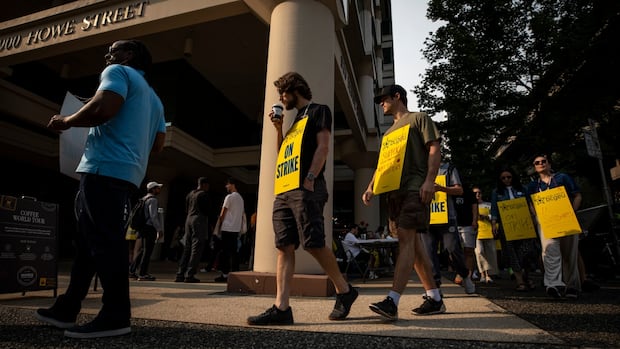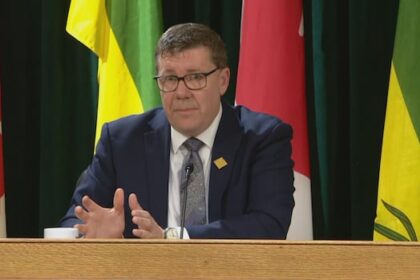British ColumbiaThe B.C. General Employees’ Union says nearly 90 workers are picketing outside the Ministry of Finance office in downtown Vancouver Thursday, joining thousands of other public service employees who began strike action earlier this weekPush for better pay comes as the B.C. government grapples with a $10B deficitShaurya Kshatri · CBC News · Posted: Sep 04, 2025 10:58 AM EDT | Last Updated: 8 hours agoThe British Columbia General Employees’ Union (BCGEU) has expanded picket sites on Thursday to include a building in downtown Vancouver that houses a finance ministry office. (Ben Nelms/CBC)One of B.C.’s largest public sector unions says it is escalating job action as its provincewide strike enters its third day, expanding picket lines in Vancouver. In a statement Thursday morning, the B.C. General Employees’ Union (BCGEU) said nearly 90 workers are picketing outside the Ministry of Finance office at 900 Howe St. in downtown Vancouver, joining thousands of other public service employees who began strike action earlier this week at government offices in Victoria, Surrey and Prince George.”The employer’s refusal to put forward a wage proposal that meaningfully addresses the affordability crisis leaves us no choice but to escalate job action,” union president Paul Finch said in the statement.The union, which represents more than 34,000 public service workers including firefighters, social workers, correctional officers and sheriffs, administrative professionals and conservation officers, is seeking an 8.25 per cent wage increase over two years, plus cost-of-living adjustments. WATCH | Deadlock persists as B.C.’s unionized government workers continue strike: Deadlock persists as B.C.’s unionized government workers continue strikeNo formal bargaining has been announced at the end of the second day of a rotating strike for unionized government workers with the two sides far from compromise. As CBC’s Katie DeRosa reports, the fight over wages comes as the B.C. government grapples with a $10-billion deficit Finch says the province’s current offer is less than half of that.”The government has so far refused to come back to the table with a revised wage mandate,” he told CBC News Wednesday.The province’s Public Service Agency and the BCGEU’s public sector bargaining team reached an impasse in July. Finance Minister Brenda Bailey would not confirm the government’s offer but pointed to the province’s wider financial situation.”We are in a time where economic circumstances have changed here in the province,” Bailey said.B.C. faces a record $10-billion deficit that has forced a hiring freeze and some layoffs.B.C. Finance Minister Brenda Bailey said the province was looking for an agreement that was fair to workers and all British Columbians. (Mike McArthur/CBC)Finch says workers should not be made to bear the burden of the deficit.”Public servants did not create this deficit,” he said. “What created this deficit is poor governance, over spending on capital projects, tax breaks for the wealthy.”Impact on broader labour talksLabour experts say the impasse could be a sign of things to come with other public sector unions, most of whom have contracts that expire this year. Premier David Eby addressed the dispute during an unrelated event in Surrey on Wednesday, noting the scope of negotiations across the public sector.”We’re in a significant year for negotiation with the public service — that’s teachers, nurses, government workers,” Eby said.B.C. Premier David Eby touches on public sector contract renegotiations while speaking at an unrelated news conference at Clayton Heights Secondary School in Surrey on Thursday. (Darryl Dyck/The Canadian Press)”Government workers did very well in the last round of negotiations, keeping up with and exceeding inflation. We’re just not able to do that this time around.”He said the province is bringing fair offers to the table despite significant “fiscal headwinds.” “But the offers need to be fair not just for the workers but also for British Columbians as a whole.”B.C. has more than 450,000 unionized public sector employees, including teachers, nurses and university staff. The Ministry of Finance estimates that a one per cent raise for those workers would cost taxpayers $419 million per year.Kendra Strauss, director of the labour studies program at Simon Fraser University, says the government is caught between trying to maintain union support and balancing the books.Many BCGEU members live paycheque-to-paycheque, according to union president Paul Finch. (Ethan Cairns/CBC)”The B.C. NDP is very sensitive on this issue,” Strauss said. “They’re painted as the big spenders and the ones who caved to public sector unions.”But Strauss added the situation isn’t just about balancing budgets. “It’s an understandable calculation on the part of the government to put a price tag on public sector wages but it also really simplifies the issue,” she added. “More importantly for us as people who live in B.C. and need good public services, there are also staffing shortages.”The Hospital Employees’ Union recently reached a framework agreement with the province that includes an unspecified wage increase for more than 67,000 workers. But the BCGEU has criticized the deal, arguing the raises fall short of inflation.The union last took job action in 2022 — a two-week strike impacting B.C. Liquor Distribution Warehouses.At the time, the government and BCGEU reached a three-year deal that resulted in between a 12 and 14 per cent wage increase for unionized workers over three years.No formal bargaining has been announced as of Thursday morning of the rotating strike.ABOUT THE AUTHORShaurya Kshatri is a web writer and reporter at CBC News Vancouver. You can reach him at shaurya.kshatri@cbc.caWith files from Katie DeRosa
BCGEU escalates job action as strike over wages enters 3rd day











